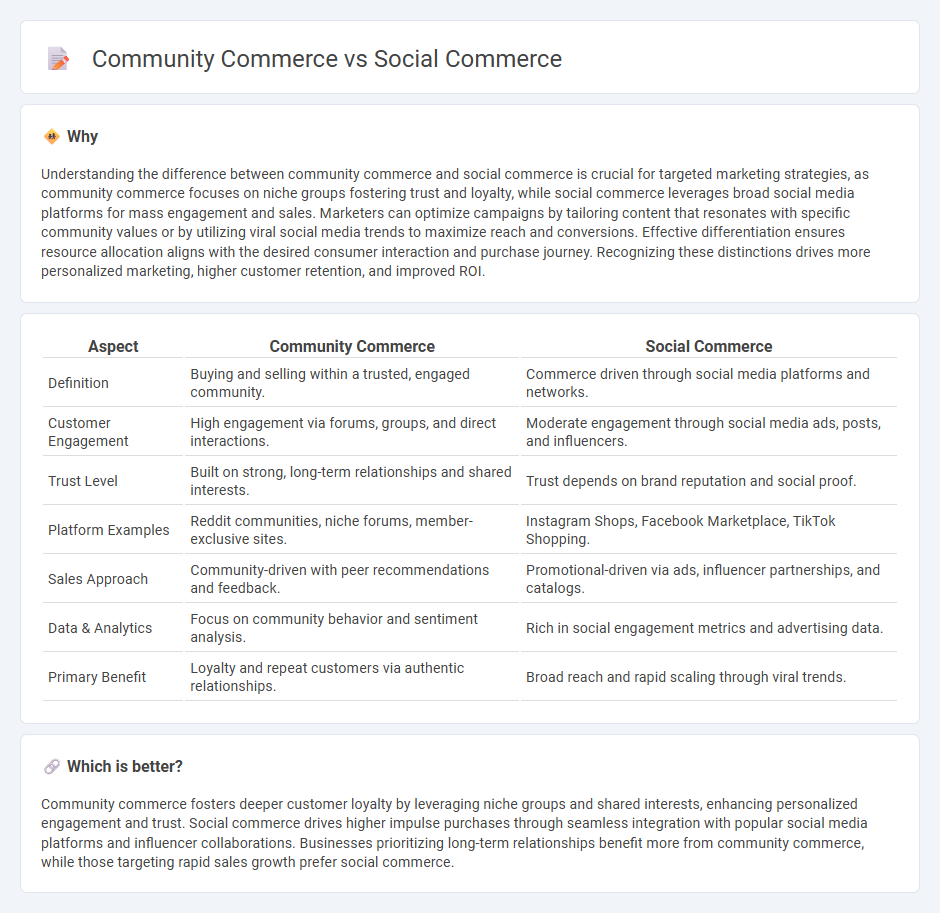
Community commerce leverages niche online groups to drive personalized and trust-based purchasing decisions, fostering deeper customer engagement and loyalty. Social commerce integrates e-commerce features directly into social media platforms, enabling seamless shopping experiences within users' social feeds and boosting impulse purchases. Explore the distinctions and benefits of community commerce versus social commerce to optimize your marketing strategy.
Why it is important
Understanding the difference between community commerce and social commerce is crucial for targeted marketing strategies, as community commerce focuses on niche groups fostering trust and loyalty, while social commerce leverages broad social media platforms for mass engagement and sales. Marketers can optimize campaigns by tailoring content that resonates with specific community values or by utilizing viral social media trends to maximize reach and conversions. Effective differentiation ensures resource allocation aligns with the desired consumer interaction and purchase journey. Recognizing these distinctions drives more personalized marketing, higher customer retention, and improved ROI.
Comparison Table
| Aspect | Community Commerce | Social Commerce |
|---|---|---|
| Definition | Buying and selling within a trusted, engaged community. | Commerce driven through social media platforms and networks. |
| Customer Engagement | High engagement via forums, groups, and direct interactions. | Moderate engagement through social media ads, posts, and influencers. |
| Trust Level | Built on strong, long-term relationships and shared interests. | Trust depends on brand reputation and social proof. |
| Platform Examples | Reddit communities, niche forums, member-exclusive sites. | Instagram Shops, Facebook Marketplace, TikTok Shopping. |
| Sales Approach | Community-driven with peer recommendations and feedback. | Promotional-driven via ads, influencer partnerships, and catalogs. |
| Data & Analytics | Focus on community behavior and sentiment analysis. | Rich in social engagement metrics and advertising data. |
| Primary Benefit | Loyalty and repeat customers via authentic relationships. | Broad reach and rapid scaling through viral trends. |
Which is better?
Community commerce fosters deeper customer loyalty by leveraging niche groups and shared interests, enhancing personalized engagement and trust. Social commerce drives higher impulse purchases through seamless integration with popular social media platforms and influencer collaborations. Businesses prioritizing long-term relationships benefit more from community commerce, while those targeting rapid sales growth prefer social commerce.
Connection
Community commerce and social commerce are interconnected as both leverage the power of social interactions to drive sales, with community commerce focusing on niche groups and shared interests, while social commerce integrates purchasing directly within social media platforms. These models utilize user-generated content, reviews, and peer recommendations to build trust and influence purchasing decisions. The synergy between community engagement and social platforms enhances customer loyalty and amplifies organic reach, creating a seamless blend of social networking and e-commerce.
Key Terms
**Social commerce:**
Social commerce integrates e-commerce directly into social media platforms like Instagram and Facebook, enabling users to discover, share, and purchase products seamlessly without leaving the app. This approach leverages user-generated content, social proof, and influencer marketing to boost conversions and enhance customer engagement. Explore the latest trends and strategies in social commerce to elevate your online sales performance.
Shoppable posts
Social commerce leverages shoppable posts to directly connect users to products within social media platforms, streamlining the purchase process through integrated shopping features on sites like Instagram and Facebook. Community commerce centers on fostering genuine interactions and trust among users through forums, groups, and peer recommendations, often utilizing shoppable posts to enhance engagement and authenticity. Explore how shoppable posts transform social and community commerce strategies to drive sales and build loyal customer bases.
Social media platforms
Social commerce leverages social media platforms like Facebook, Instagram, and TikTok to facilitate seamless shopping experiences through integrated storefronts, shoppable posts, and targeted advertising. Community commerce centers on building trust and engagement within niche online communities, forums, or groups on platforms such as Reddit, Discord, and specialized Facebook Groups, where peer recommendations and user interactions drive purchasing decisions. Explore how these distinct approaches transform digital sales by combining social engagement with commerce.
Source and External Links
Social commerce - Social commerce is the use of social networks to facilitate e-commerce transactions entirely within social media platforms, from browsing products to checkout.
What is social commerce? - TechTarget - Social commerce leverages social media apps like Facebook, Instagram, TikTok, and Pinterest to market and sell products directly, using data and social network algorithms to create personalized shopping experiences that shorten the path to purchase.
What Is Social Commerce? Tips and Trends - Salesforce - Social commerce allows businesses to engage customers through quick, seamless shopping experiences on social media, using influencer marketing, personalized content, and omni-channel strategies to boost brand awareness and sales.
 dowidth.com
dowidth.com